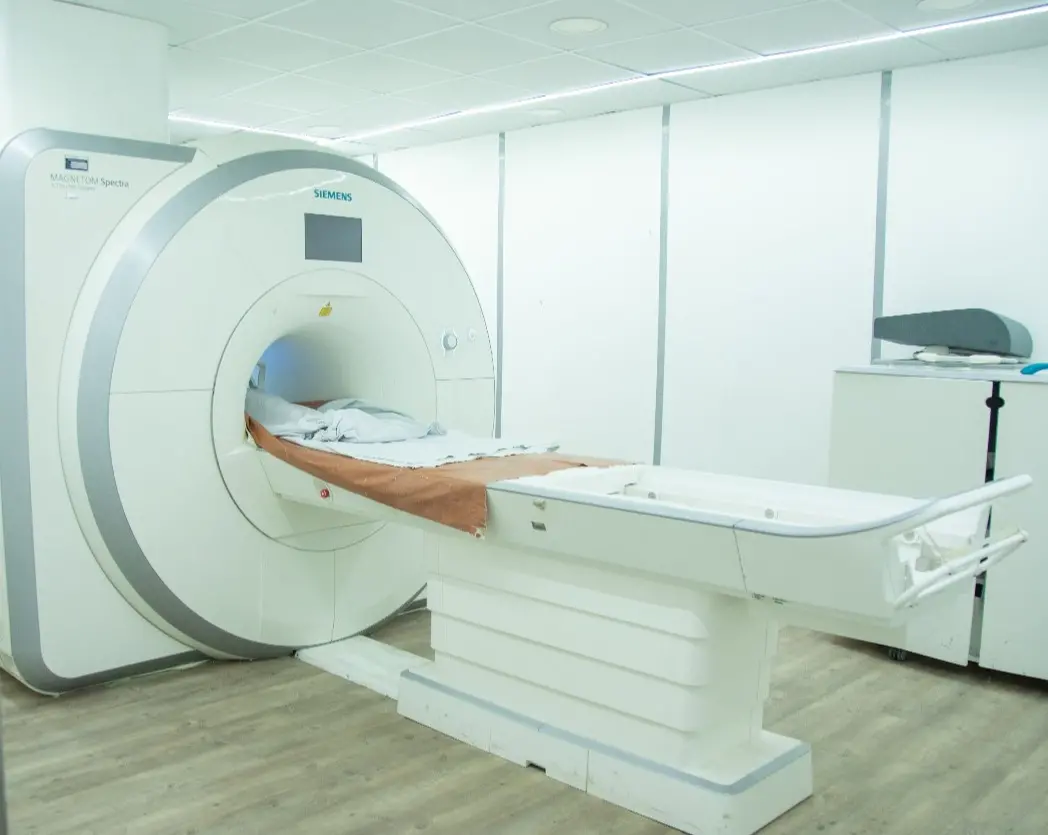Uchunguzi, Radiolojia na Mionzi

3.0 Tesla MRI Machine
Idara ya Radiolojia ya Hospitali ya Benjamin Mkapa ni kitovu cha huduma za uchunguzi na upasuaji wa kuingilia kwa kutumia picha, na ina mchango mkubwa katika utoaji wa huduma bora kwa wagonjwa katika fani zote za kitabibu. Tangu kuanzishwa kwake, idara hii imekua na kuwa kitengo kamili cha picha za uchunguzi, kikitoa huduma mbalimbali za kisasa kwa ajili ya uchunguzi wa kitabibu na taratibu za matibabu zinazoongozwa na picha. Ikiwa na wataalamu waliobobea wakiwemo mionzi (radiologists), waradiografia (radiographers), na wataalamu wa upasuaji wa kuingilia, idara inatoa msaada wa kitaalamu katika uchunguzi sahihi, upangaji wa matibabu, na utekelezaji wa taratibu za matibabu kwa wagonjwa waliolazwa na wa nje.
Huduma za Idara
1. Radiolojia ya Uchunguzi (Diagnostic Radiology):
Tunatoa huduma mbalimbali za picha za uchunguzi kwa kutumia vifaa vya kisasa kusaidia utambuzi sahihi na maamuzi ya kitabibu.
-
X-Ray na Fluoroscopy: Upigaji picha wa jumla, uchunguzi kwa kutumia dawa ya contrast kama barium, hysterosalpingography, na taratibu zinazoongozwa na fluoroscopy.
-
Ultrasound: Pamoja na ultrasound ya tumbo, mimba, mfumo wa uzazi wa mwanamke, mishipa ya damu, na misuli na mifupa.
-
Mammography: Picha za matiti kwa teknolojia ya kidijitali kwa ajili ya kugundua mapema saratani ya matiti, pamoja na huduma za biopsy inapohitajika.
-
CT Scan: Upigaji picha wa tabaka kwa tabaka (multi-slice CT) kwa wagonjwa wa ajali, saratani, moyo, na ubongo, ikiwa ni pamoja na CT angiography na taratibu zinazoongozwa na CT.
-
MRI: Picha zenye mwonekano wa juu kwa uchunguzi wa magonjwa ya ubongo, mifupa, nyonga, na tumbo.
-
CT Intravenous Urography (CT IVU) na CT Triphasic Liver Studies: Hufanyika mara kwa mara kusaidia huduma za figo na saratani.
2. Radiolojia ya Kuingilia (Interventional Radiology):
Sehemu inayokua kwa kasi inayotoa huduma za uchunguzi na matibabu kwa kutumia mbinu zisizo za kufungua mwili, zinazoongozwa na picha.
-
Biopsy zinazoongozwa na picha (ultrasound na CT)
-
Utoaji wa majimaji mwilini (kwa mfano usaha, maji kwenye mapafu au tumbo)
-
Kupitisha mirija kwa ajili ya mkojo (percutaneous nephrostomy) na bile (biliary drainage)
-
Uwekaji wa mirija ya mishipa (mfano PICC lines)
-
Mpango wa kupanua huduma hadi embolization na matibabu ya uvimbe kwa njia ya kuunguza (ablation)
Wafanyakazi na Utaalamu
-
Madaktari wa Radiolojia: Timu ya wataalamu waliobobea katika uchunguzi na taratibu za kuingilia, wakiwa na mafunzo ya juu ya taaluma mbalimbali.
-
Radiographers: Wataalamu wa kuendesha vifaa vya picha na kupanga mgonjwa kwa usahihi.
-
Wauguzi na Mafundi: Hutoa msaada wakati wa taratibu za kuingilia na kumhudumia mgonjwa kabla, wakati, na baada ya taratibu.
-
Ushirikiano: Idara inashirikiana kwa karibu na madaktari wa saratani, upasuaji, dawa za ndani, watoto na huduma za dharura.
Vifaa na Teknolojia
-
Mfumo wa Kidijitali wa Picha (PACS): Unaruhusu upatikanaji wa picha haraka na huimarisha mijadala ya kitabibu kwa njia ya multidisiplinary.
-
Vyumba vya Ultrasound na CT: Vyenye vifaa vya Doppler, elastography na skana za CT zenye uwezo wa multiphase.
-
Kitengo cha MRI: Kinatoa huduma za hali ya juu kwa uchunguzi wa ubongo, mifupa, na tumbo.
-
Chumba cha Upasuaji wa Kuingilia: Kwa sasa kinatumika kwa pamoja na vyumba vya CT na ultrasound, lakini kuna mpango wa kupanua na kuwa na chumba maalum chenye C-arm fluoroscopy.
Mafanikio na Hatua Muhimu
-
Hutoa zaidi ya uchunguzi wa picha 30,000 kwa mwaka, huku mahitaji ya CT, MRI na huduma za kuingilia yakiongezeka.
-
Kuingiza viwango vya kitaalamu vya taarifa za uchunguzi ili kuboresha muda wa matokeo na usahihi wa utambuzi.
-
Kuanza huduma za biopsy zinazoongozwa na picha, hivyo kupunguza upasuaji wa uchunguzi.
-
Kuchangia kwa kiwango kikubwa katika kusaidia huduma za saratani, ajali, na magonjwa ya kuambukiza.
Mipango ya Baadaye
-
Kujenga Chumba Maalum cha Radiolojia ya Kuingilia: Chenye vifaa maalum vya fluoroscopy na angiography ili kupanua huduma.
-
Kuimarisha Msaada kwa Huduma za Saratani: Kwa kushirikiana na Kituo cha Umahiri cha Saratani kinachotarajiwa kujengwa.
-
Kuanza Taratibu kwa Matiti na Tezi Dume: Ikiwemo biopsy za stereotactic na matibabu ya kuunguza kwa kutumia picha.
-
Mafunzo na Ujenzi wa Uwezo: Kwa kushirikiana na taasisi za elimu na za kimataifa katika kuongeza ujuzi wa kitaalamu.
-
Matumizi ya Ripoti za Kisasa na Akili Bandia (AI): Ili kuboresha usahihi wa utambuzi na ufanisi wa kazi.
-
Programu za Uchunguzi katika Jamii: Ikiwemo huduma za picha kwa njia ya magari ya uchunguzi (mobile imaging), hasa kwa uchunguzi wa matiti na tumbo katika maeneo yenye huduma haba.

